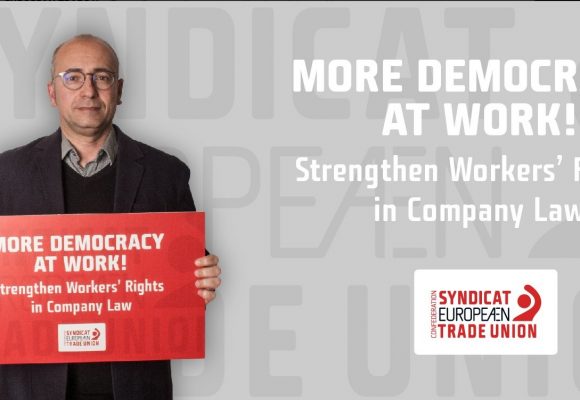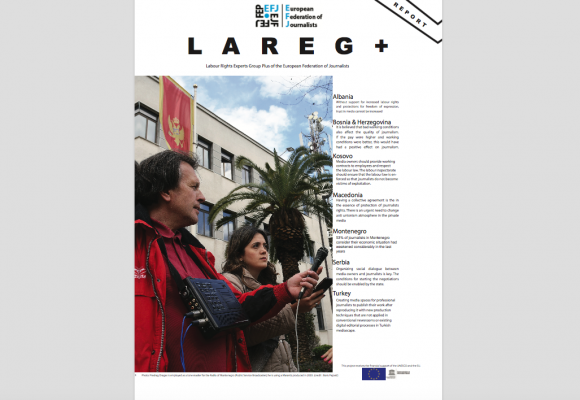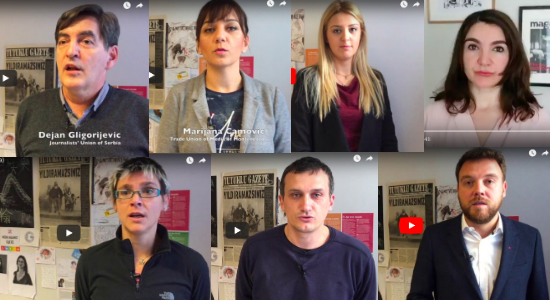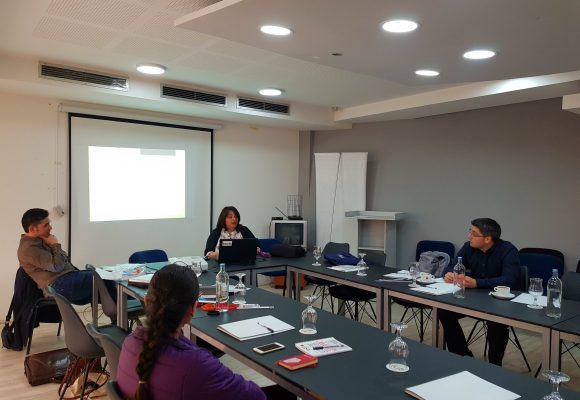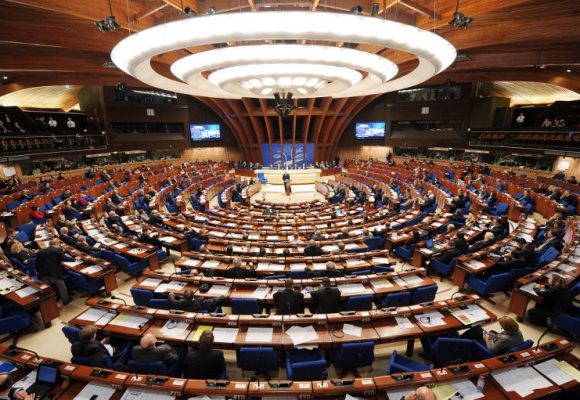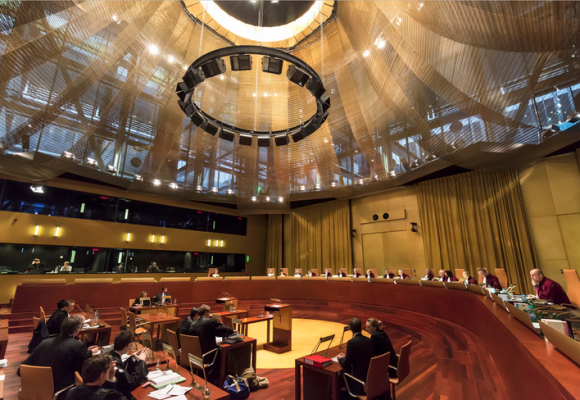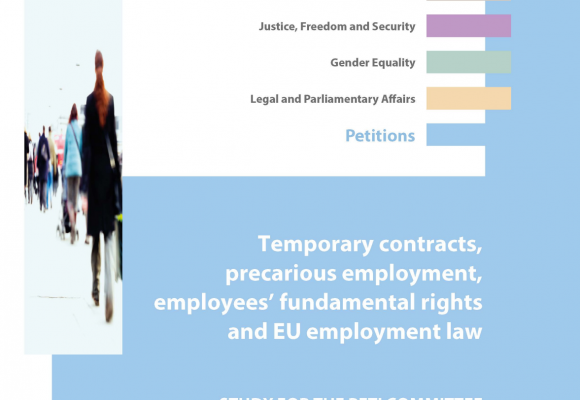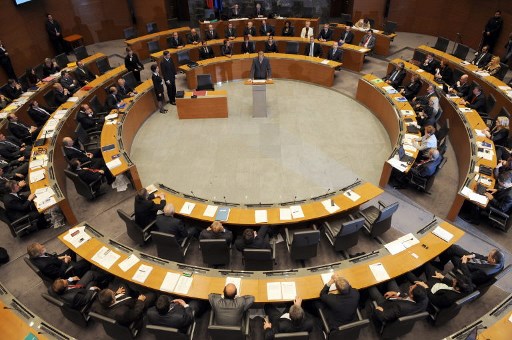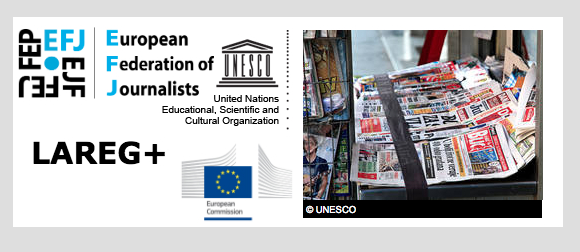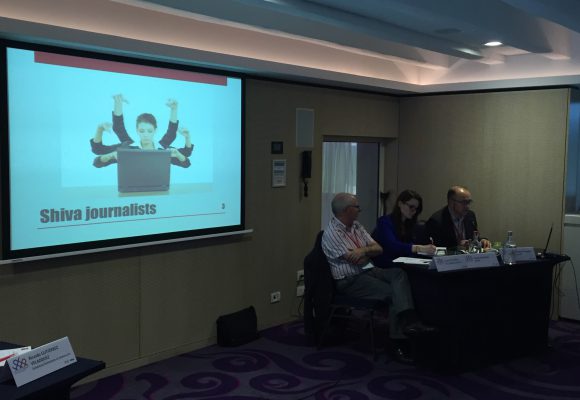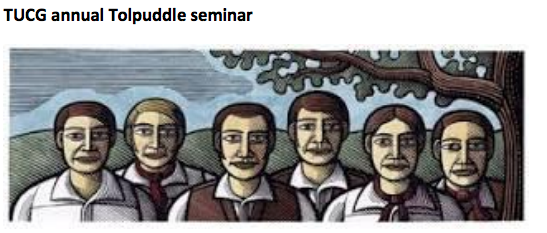#labour rights
European trade union leaders stand up for solidarity with migrants
On International Migrants Day, trade union leaders across Europe, representing 45 million members from 90 trade union organisations in 38 European countries, will reiterate their support for solidarity with migrants by backing the first European Citizens’ Initiative (ECI) on migration. Trade union leaders showed their commitment by signing the ‘We Are a Welcoming Europe’ initiative at a high-level meeting of the European Trade Union Confederation (ETUC). “We are totally opposed to criminalising those who offer humanitarian assistance to migrants” said Luca Visentini, ETUC Secretary General. “The authorities should applaud and support those who help refugees fleeing life-threatening conflict. The Citizens Initiative rightly defends…
More democracy at Work!
The EFJ General Secretary Ricardo Gutiérrez and trade union leaders from all over Europe today united in their demand for more workers’ participation and workplace democracy. They are calling on MEPs to improve the EU company law package currently going through the European Parliament to strengthen workers’ information, consultation and board-level representation in the new types of companies allowed by this legislation; MEPs to strengthen information to and consultation and representation of workers in the Draft Directive on restructuring and insolvency also going through the Parliament; the European Commission to publish its long-overdue revision of the European Works Council Directive…
EFJ’s expert group’s report on journalists’ working conditions
A new report about journalists’ labour rights in Europe was published by the Labour Rights Experts Group Plus (LAREG+) of the European Federation of Journalists (EFJ) on May 2018. It contains national reports about journalists’ labour rights from the following countries: Albania: Without support for increased labour rights and protections for freedom of expression, trust in media cannot be increased. Bosnia & Herzegovina: It is believed that bad working conditions also affect the quality of journalism. If the pay were higher and working conditions were better, this would have a positive effect on journalism. Kosovo: Media owners should provide working…
Campaign to improve journalists working conditions in the Western Balkans and Turkey
The European Federation of Journalists (EFJ) is today (08/05/2018) launching a video campaign to raise awareness about the poor working conditions of journalists and media workers in the Western Balkans and Turkey as documented by the European Commission’s Enlargement package 2018 published in April 2018. Together with the support of its affiliates in the region, the EFJ is putting the focus on Albania, Bosnia and Herzegovina, Kosovo, Macedonia, Montenegro, Serbia and Turkey, where working as a journalist too often means job insecurity, low wages and attacks. This campaign aims to push for better working conditions in order to support the production…
Unions in Western Balkans and Turkey setting strategies to improve working conditions for journalists
How to shape the future of journalists’ trade unions and associations in the Western Balkans and Turkey? The EFJ’s Labour Rights Expert Group Plus (LAREG+), composed of representatives from Albania, Kosovo, Macedonia, Montenegro, Serbia and Turkey, convened on the 10th of April 2018 in Skopje (Macedonia) to reflect on a one-year strategic plan to improve journalists’ working conditions in the region. This meeting was the last of a series of trainings organised throughout the year 2017-2018 in the framework of the project Building Trust in Media in South East Europe and Turkey, financially supported by the UNESCO and the European Union.…
Council of Europe Culture Committee asks governments to strenghten the status of journalists
The Culture Committee of the Parliamentary Assembly of the Council of Europe (PACE) has adopted a draft resolution asking European governments to do more to protect media professionals, revising laws if necessary, as they state that media freedom is a “key prerequisite for the existence and development of a democratic society”. At a meeting in Bucharest on 4 December 2017, PACE Committee recognised the precarious nature of the current journalism profession, and the threats to journalistic values and freedoms. In response, PACE Committee unanimously adopted the draft resolution, asking governments of member states to assume their obligation to protect media professionals, to…
European Court: holiday pay for freelancers and bogus self-employed
On 29 November 2017, the European Court of Justice ruled in favour of paid annual leave for self-employed and bogus self-employed workers. Now, anyone who has been bogus self-employed can demand additional payment for annual leave. Article 7 of Directive 2003/88/EC of the European Parliament and Council of 4 November, 2003, provides 4 weeks of paid annual leave for every worker, and the European Court has said that this must not be thwarted by employers. The case came to the European Court after a British case in which Mr King, retiring after 13 years of employment, sought to recover payment…
Study recommends EU action to protect atypical workers
A recent study explored ‘Temporary contracts, precarious employment, employees’ fundamental rights and EU employment law‘, commissioned by the European Parliament’s Policy Department for Citizens’ Rights and Constitutional Affairs at the request of the Committee on Petitions. The findings have implications for journalists, as atypical and precarious employment has been tied to media industries and digitisation. The study emphasises that precarious employment is a fundamental rights issue of enormous weight and significance within the EU’s normative order. Some groups, such as women and younger workers, are more affected by precarious employment. Self-employment, which affects many freelancers and journalists, is discussed in…
Slovenia to reform labour laws enforcing contractual obligations
The Slovenian government has recently introduced two draft labour laws on employment and labour inspection. The main changes concern giving the labour inspectors more authority to act, especially when the employer fails to pay the salary of employees, accelerate the process whereby the unemployed take up employment again and make employment contract termination more flexible. “Precarious conditions are becoming more and more common, not just in Slovenia, but also in Europe,” said Anja Kopač Mrak, the Slovenian minister of Labour, Family, Social Affairs and Equal Opportunities at the voting session of the draft labour laws at the beginning of this…
South East Europe and Turkey journalists join European Labour Rights Experts group
Journalists and media workers from South East Europe and Turkey are able to share best practices, illuminate present challenges in labour rights and benefit from legal expertise after joining European Labour Rights Experts Group. “If journalists’ working conditions are poor, how can media be the driver for sustainable and peaceful development in the region? By promoting these exchanges, UNESCO and the European Federation of Journalists (EFJ) aim for a collective upgrade of media professionals’ rights, for the benefit of publics and democracy,” commented Mehmet Koksal, project officer from EFJ. Under the EU-funded project “Building Trust in media in South East…
European trade unions call for stronger protection of workers in digital economy
European trade unionists and the European Commission have called for a new start for strong social dialogue following in a conference with multi-stakeholders on ”Shaping the new world of work” held by the European Trade Union Institution (ETUI) and the European Trade Union Confederation (ETUC) in Brussels. The conference was kicked off by a panel of high-level speakers from European and international institutions, including Marianne Thyssen, EU Employment Commissioner, Jeffrey Franks, International Monetary Fund (IMF) Europe Office Director, Guy Ryder, Director-General of the International Labour Organisation (ILO), Mark Keese, head of the OECD’s employment, analysis and policy division, Thomas Handel,…
UK government to roll out anti-trade union laws
The UK government is planning to introduce anti-trade union laws that will restrict strikes and hamper the basic human rights of workers, says the National Union of Journalists (NUJ), an EFJ affliate in the UK. According to the NUJ, the proposed bill aimed at curtailing trade union activity would impose a minimum 50% turnout in strike ballots, with public sector unions requiring at least 40% of those eligible to vote. Michelle Stanistreet, NUJ general secretary said: “Forget the language of fairness and rights being peddled by the Tories – this is the most cynical of attacks designed to finish what…
EFJ webinar on social security for freelance journalists in Europe
Join us for a webinar on April 21, 2015 at 12:00 AM CEST. Register now:! https://attendee.gotowebinar.com/register/1619804193653421057 The European Federation of Journalists (EFJ) and its Freelance Expert Group (FREG) in cooperation with the Deutscher Journalisten-Verband (DJV) are organising another webinar, this time on social security for freelance journalists in Europe, a theme ever more important in times of increasing flexibility and decreasing social security. Ivan Declercq, freelance advisor of the Flemish journalist association (VVJ) will give some examples from European countries including Belgium, the Netherlands, France and Norway. The special system in Germany of the so-called Künstlersozialkasse (KSK) (artists’ social insurance)…
Why do they leave journalism?
“Why do they leave journalism?” – This is the question asked to 38 former journalists by journalism student Hélène Brédart in a project initiated at the Université de Liège and reproduced by Jean-François Dumont of the Belgian Association of Professional Journalists (AJP, member of EFJ). The results of the project published in the latest edition of the monthly Journalistes by the AJP show that the deteriorating working conditions and practices in journalism make are major reason why journalists left the profession. The most frequently mentioned reasons for journalists to leave their job are: • Increasing workload: The digital development and restructuring measures are putting…
London: the world capital of foreign correspondents
The European Federation of Journalists (EFJ) has attended at the Brussels Press Club, the launch of a new book Mapping Foreign Correspondence in Europe showing that London is the world capital of foreign correspondents. The editor of the book Georgios Terzis has conducted a pan-european research for almost two years and gathered data about the 6.600 registered journalists working as correspondents in 27 countries (this first edition does not include information for Poland and Italy). According to the data disclosed, the country that has the highest number of foreign correspondents working there is the United Kingdom (1.700), following by France (945), Belgium…
Deteriorating working conditions undermine press freedom, says study
Deteriorating working conditions of journalists put press freedom in danger, according to a study published by the University of Fribourg and the Federal Office of Communications in Switzerland. The study participated by 1000 journalists who are members of the affiliate of the European Federation of Journalists, impressum, proves that the deteriorating working conditions have a negative impact on press freedom and quality of journalism. The results suggest that economic pressure from advertisers and the media owners are jeopardising the editorial freedom of media. Ricardo Gutiérrez, EFJ General Secretary said: “The conclusions are clear: we fought hard to ensure that press…


